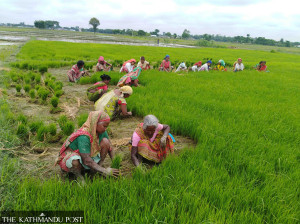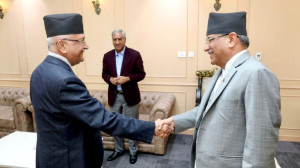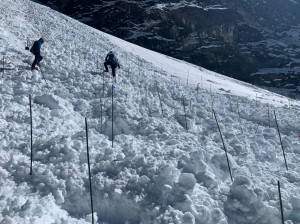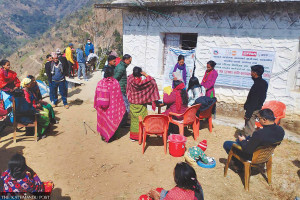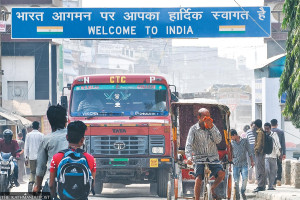 16.12°C Kathmandu
16.12°C KathmanduHealth
Health ministry seeks PABSON, N-PABSON’s help in measles-rubella vaccination drive
Around 5.7 million children in 75 districts will be inoculated with MMR vaccine in the three-week campaign.
Post Report
The Ministry of Health and Population will request the Private and Boarding Schools’ Organisation Nepal (PABSON) and the National Private and Boarding Schools’ Association Nepal (N-PABSON) to run immunisation centres at private schools for its measles-rubella vaccination drive.
“We will make a formal request to the PABSON and N-PABSON for help to run immunisation centres at private schools,” said Dr Abhiyan Gautam, chief of the Immunisation Section at the Family Welfare Division of the Department of Health Services. “We will also request the Ministry of Education, Science and Technology to instruct schools to help in the immunisation drive.”
Around 5.7 million children from 75 districts will be given the vaccine in the three-week-long campaign set to start on February 25.
Officials said that immunisation centres will be schools in most of the districts.
“In the past, some private schools had not cooperated with health workers, some had refused to allow immunisation centres to run there, some barred health workers from administering the vaccine to children from other schools and some sought parents’ consent to administer the vaccine,” said Gautam. “To prevent such a scenario, we will discuss with all concerned agencies, organisations and people.”
The campaign has already been completed in Jajarkot and Rukum West, the two districts worst hit by the magnitude 6.4 earthquake on November 3.
The health ministry said that children between nine months and 15 years from 24 high-risk districts will be jabbed with the measles-rubella vaccine in the campaign. The vaccine will be administered to children between nine months and five years in 51 districts.
Measles is a highly contagious viral disease transmitted through fluids from an infected person’s nose, mouth or throat. It can be potentially deadly for unvaccinated people.
Nepal had committed to eliminating measles by 2023 after missing the earlier deadline of 2019. To declare measles as eliminated, the number of cases should be less than five per 1 million people throughout the year.
However, the deadly virus was reported in over 14 districts of the country at the start of 2023. At least one child died and hundreds were infected with the disease last year.
According to Gautam, 19 of the 24 high-risk districts are from the Tarai region bordering India and three of Kathmandu Valley. In June last year, Gokarneshwar of Kathmandu reported a measles outbreak. The disease was reported also in 2020 in some local units of Lalitpur and Kathmandu, the Capital.
The health ministry launches a nationwide measles-rubella campaign every four years to cover the children who missed the vaccine doses in the routine programme. Every year thousands of children miss the vaccine doses, as the coverage rate of the measles-rubella vaccine is below 90 percent.
A coverage rate of over 95 percent is required for the disease to be eliminated, said Dr Shyam Raj Upreti, a child health expert. “Authorities concerned should do more to meet the elimination target.”
Measles and rubella are contagious viral diseases transmitted through droplets from the nose, mouth or throat of an infected person. Early symptoms, which usually appear 10 to 12 days after infection, include high fever, runny nose, bloodshot eyes and tiny white spots in the mouth. Several days later, rashes develop on the face, upper neck and other body parts.
Measles was once endemic in Nepal, with an average 90,000 cases reported annually from 1994 to 2004.
The government introduced a routine measles vaccination programme in the country in the late 1980s.
Although Nepal had committed to eliminating measles by 2019, the deadline was extended to 2023 due to frequent occurrences of the disease.
The ministry has now extended the deadline for measles elimination to 2026.















